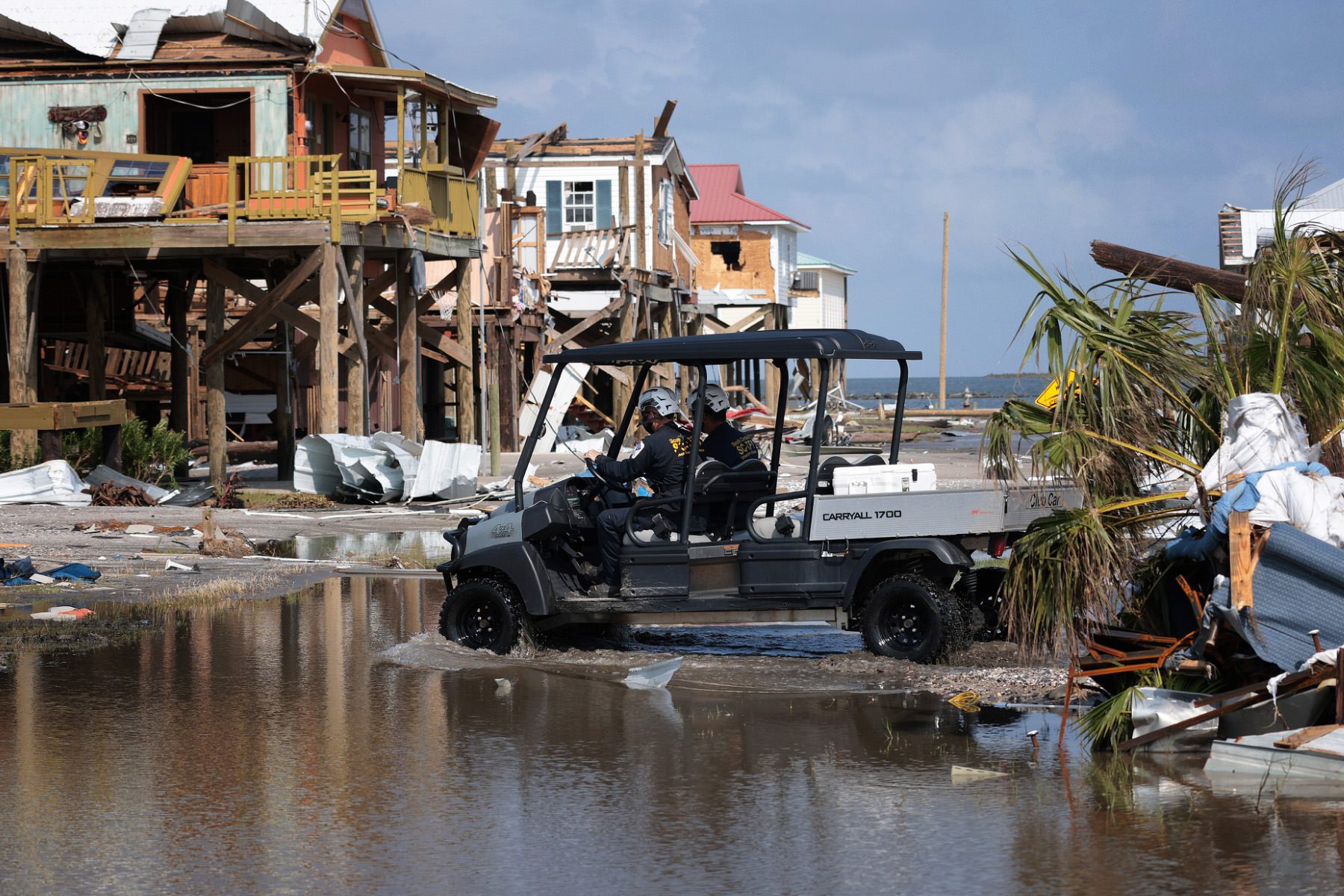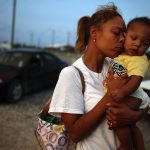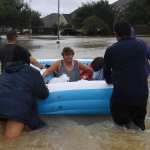The remnants of Hurricane Ida brought severe rainfall and flooding to New York, New Jersey and Pennsylvania this week, after the storm earlier flattened homes and businesses and left tens of thousands without power in the Gulf Coast. And for many, the danger is compounded: Disasters like Ida that displace people and overwhelm emergency service providers also increase the risk of sexual, domestic and gender-based violence, which disproportionately affects women, girls and LGBTQ+ people.
This is true of both natural disasters and health crises like the COVID-19 pandemic, which exacerbate existing societal problems such as racism, misogyny, homophobia and transphobia, said Jessie Nieblas, the director of education and prevention at the Louisiana Foundation Against Sexual Assault (LaFASA). Violence occurs in the chaos of people fleeing their homes and living in overcrowded conditions with scarce resources. Yet little is done to circumvent it.
Data on the number of violent incidents during public emergencies is difficult to find, but news reports and research have captured some of the stories. After Hurricane Katrina in 2005, a 46-year-old woman told NPR that she was raped on the day of the storm while trying to take refuge inside the hallway of an apartment building.
A survey from the National Sexual Violence Resource Center collected data on sexual assaults during Hurricanes Katrina and Rita, which hit within a month of each other in 2005. The largest share of sexual assaults entered into an anonymous database, 30.8 percent, took place inside evacuation sites and that 93 percent of the victims were women.
Researchers from Loyola University New Orleans wrote in 2007 that in the wake of Katrina, “in a number of instances, as we have found, when a rape was reported to a first responder such as a police officer, an official statement was not taken because of other life-threatening priorities.” They recommended that sexual and gender-based violence prevention be incorporated into emergency preparedness.
But 16 years after Hurricane Katrina — and with more widely available research on the link between disasters and violence — this prevention is not a consistent part of disaster preparation. In Louisiana, efforts vary and are generally led by underfunded nonprofits and community-based groups.
Social workers who are trained to identify and treat domestic violence and other types of trauma are stationed at Louisiana state shelters, Catherine Soileau Heitman, director of communications with the Louisiana Department of Children and Family Services wrote in an email. It’s unclear what security measures are taken inside the shelters to mitigate possible assault. But currently, the state does not provide any funding specifically aimed at sexual violence prevention during disasters, Nieblas said.
With thousands displaced in the wake of Hurricane Ida, Nieblas spoke with The 19th about what can be done to protect the most vulnerable.
This interview has been edited for length and clarity.
Candice Norwood: Can you talk about how disasters like hurricanes can affect cases of sexual and gender-based violence?
Jessie Nieblas: So the big central theme is that disasters exacerbate all existing inequalities, including vulnerability to sexual violence, but also racism, economic injustice, homophobia, transphobia. All of these things get exacerbated and sometimes brought to the surface by disasters.
Disasters can also create new vulnerabilities. For example, people might be engaging in survival sex for housing, they might stay or go back to unsafe living conditions. If they have other marginalized identities, they might not feel comfortable with mainstream services that are available like mainstream shelters or going to law enforcement authorities to report something or to seek safety.
We found that places where there are strong systems of prevention and response in place — and where the kind of regular work around partnerships and capacity building, and the ordinary operations and preparations can impact the severity and can mitigate some of the damage.
Do you think sexual violence prevention should be incorporated into disaster response? How would you assess efforts to do that throughout Louisiana?
It 100 percent should be, and how it varies from location to location. I will say that the majority of disaster planning seems to happen right after a disaster. Then we tend to cross our fingers that it won’t happen again and get back to the regular business of prevention and response. That happens with me sometimes, too. You’re never more motivated than when it is directly affecting you in your communities. Then there’s also just so much work to be done in the day to day that sometimes it does get forgotten.
So I will say, yes, it absolutely should happen more, and also we all need to be a part of just continuous disaster planning. Our centers and LaFASA, we are always open and available to provide that training around responding to folks during a disaster, creating a disaster plan that incorporates sexual violence prevention or response.
I do think that a robustly funded program that takes into account gender-based violence, prevention and response is essential for our community. I would encourage policymakers to create that mandate. There are agencies that are doing it as an ongoing practice. The [Louisiana Alliance of Children’s Advocacy Centers], for example, has a cool disaster preparedness program.
Addressing sexual violence as a whole is important, but are there specific things that can be done from the local, state and federal levels to anticipate and better support people in the case of these disaster situations?
It’s things like understanding where another service provider will take over a hotline, for example, or having the capacity to redirect services so that there’s a seamless connection.
It’s things like making sure law enforcement offices are equipped to take courtesy reports and that officers are trained on how to do that effectively. So if you’re [assaulted] in New Orleans, and you evacuate to Memphis and you go to the Memphis Police Department, they would be able to take the report in an effective way.
It’s things like training first responders, including, for lack of a better word, informal first responders, churches and a lot of institutions that are not the official responders. So, trying to implement a way where all of those folks can be trained in how to respond safely to somebody who discloses that they were assaulted, how to create a safe and open and safe-feeling environment.
Then it’s making sure that organizations have flexible funding, so that they’re able to build up community trust by meeting people’s needs, even if it may not fit right within their mission. So, for example, a lot of our funding is tied up in grants, and especially federal government grants. So we’re not able to necessarily help the survivors who we serve to make rent. But that might be what they need right now.
Louisiana doesn’t give any state funding to sexual violence prevention and response. There is zero money in our state budget for sexual violence prevention or response, it’s all federal, and then individual community donations. So these organizations, they’re underfunded and under-resourced, and all of the funding is tied up.
Proper prevention is also any work that’s done around economic justice, around racial justice, around eliminating homophobia and transphobia, and around supporting women in education in the workplace. All of that work will impact sexual assault survivors in a disaster.
During Hurricane Katrina we heard stories of people being trapped inside the New Orleans Superdome and subject to attacks without any way of accessing help. Is there anything that can be done to prevent danger when people are trapped inside evacuation sites?
There are things that can be done if there ever is a situation of a mass evacuation site where their safety is a tremendous concern. I think it’s training up staff members on how to respond to a disclosure, implementing safety mechanisms around keeping children safe and not separated from the family.
Making sure that however the shelter is laid out, that volunteers are thoroughly vetted, that people have safe places where they can decompress, that the lighting is done well. There are infrastructure things that can be done to promote safety, and LaFASA is open to having discussions with places that open up their doors about best practices based on what the individuals face.
I also alluded to training staff, so making sure that staff know that sexual violence is a real issue and a real concern. And it’s not just not only about assaults that happen within that facility, it’s also being able to effectively respond to people whose trauma is brought back, perhaps from a previous assault or from a previous incident.
I think Katrina was definitely a cautionary lesson. There were horrifying things that were reported. I think that Katrina was unique in the sense of having a mass evacuation site. I also think the access to technology to be able to make a report has improved quite a bit. I think also we’re at a different point with our awareness of sexual violence than 16 years ago. We’re not perfect, definitely, but I think we have been building up people’s kind of general awareness, including the awareness of responders.
If you or a loved one are in need of services from a sexual assault center in Louisiana, you can call the statewide hotline at 888-995-7273, or visit http://lafasa.org/main/sexual_assault_centers.





